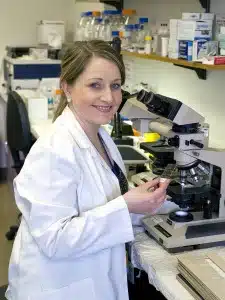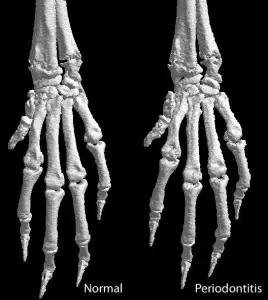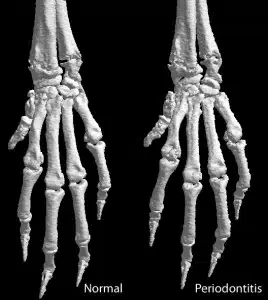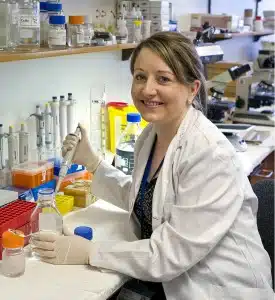
The scientists are using this knowledge to investigate whether treating mouth conditions could help relieve arthritis.
As part of her PhD studies, Melissa Cantley worked with colleagues at the University of Adelaide to develop a new way to study these two diseases and their relationship. She is presenting her research this week as part of Fresh Science — a national program for early-career scientists.
“In this model we can induce gum disease in mice using a type of bacteria associated with human disease,” Melissa said.
“We can then induce inflammatory arthritis to better understand how one disease influences another,” she said.
“We found that mice with gum disease developed worse arthritis.”

3D images of mouse paws created using live micro CT scanning. The image on the right highlights evidence of bone loss in the joints of a mouse with gum disease.
(Credit: Melissa Cantley/Fresh Science)
Studies have shown that patients with rheumatoid arthritis are more likely to suffer tooth loss than those without rheumatoid arthritis. This is often associated with a gum disease called periodontal disease, which results in red, inflamed gums and loss of bone and tissues that support the teeth.
More than 60 per cent of the world’s population suffers from periodontitis.
In rheumatoid arthritis, the body’s immune system attacks healthy tissue in the joints, leading to inflammation and loss of bone and cartilage. This results in a painful condition which impacts normal joint function.
The research also found signs of bone loss in the joints of mice with gum disease alone and bone loss in the jaws of mice with arthritis alone.
“Not only did the gum disease influence joint tissues, but arthritis also influenced tissues in the mouth,” Melissa said.
“The relationship between these two common diseases is very complex and we can now use this model to further our understanding,” she said
Translation to clinical studies is underway to determine if treatment of periodontitis can help reduce the symptoms associated with arthritis.
The research is a result of unique collaborations between both the Discipline of Anatomy and Pathology in the School of Medical Sciences and the School of Dentistry. Melissa’s PhD supervisors are Associate Professor David Haynes and Professor Mark Bartold.
Melissa Cantley is one of 12 early-career scientists unveiling their research to the public for the first time thanks to Fresh Science, a national program sponsored by the Australian Government.
An example of Melissa’s published work is online here: http://www.ncbi.nlm.nih.gov/pubmed/21434962
And there is more information on Melissa online here: http://www.adelaide.edu.au/directory/melissa.cantley
For interviews
- Melissa Cantley on melissa.cantley@adelaide.edu.au
- For Fresh Science contact AJ Epstein on 0433 339 141 or aj@scienceinpublic.com.au or Niall Byrne, 0417 131 977 or niall@scienceinpublic.com.au
- For University of Adelaide contact David Ellis, Media and Communications Officer, david.ellis@adelaide.edu.au






 Fresh Science is on hold for 2022. We will be back in 2023.
Fresh Science is on hold for 2022. We will be back in 2023.